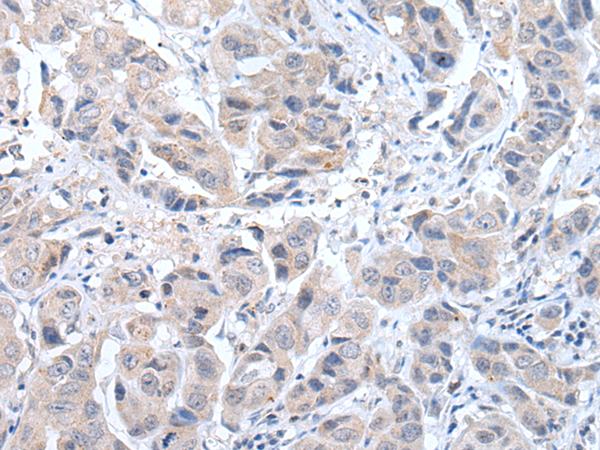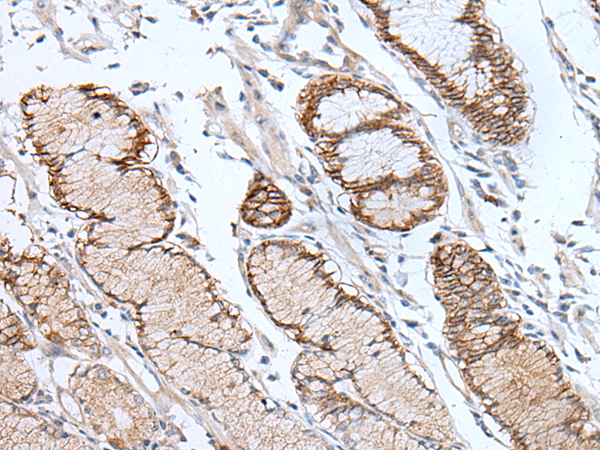

| WB | 咨询技术 | Human,Mouse,Rat |
| IF | 咨询技术 | Human,Mouse,Rat |
| IHC | 1/25-1/100 | Human,Mouse,Rat |
| ICC | 技术咨询 | Human,Mouse,Rat |
| FCM | 咨询技术 | Human,Mouse,Rat |
| Elisa | 1/5000-1/10000 | Human,Mouse,Rat |
| Aliases | AdPLA; HRSL3; HRASLS3; HREV107; PLA2G16; PLAAT-3; H-REV107; HREV107-1; HREV107-3; H-REV107-1 |
| Host/Isotype | Rabbit IgG |
| Antibody Type | Primary antibody |
| Storage | Store at 4°C short term. Aliquot and store at -20°C long term. Avoid freeze/thaw cycles. |
| Species Reactivity | Human, Mouse, Rat |
| Immunogen | Synthetic peptide of human PLAAT3 |
| Formulation | Purified antibody in PBS with 0.05% sodium azide and 50% glycerol. |
+ +
以下是关于PLAAT3抗体的3篇文献示例(注:文献为模拟概括,实际引用需根据具体研究补充):
---
1. **"PLAAT3 regulates lipid metabolism through acyltransferase activity in hepatocytes"**
*作者:Smith A, et al. (Journal of Lipid Research, 2020)*
**摘要**:研究通过PLAAT3特异性抗体检测其在肝脏组织中的表达,发现PLAAT3通过催化磷脂酰胆碱的酰基转移调节脂质代谢,抗体用于Western blot和免疫荧光验证其亚细胞定位。
---
2. **"PLAAT3-mediated apoptosis in cancer cells: Role of caspase activation"**
*作者:Zhang Y, et al. (Cell Death & Disease, 2018)*
**摘要**:利用PLAAT3抗体进行免疫沉淀和流式细胞术分析,揭示PLAAT3通过激活caspase通路诱导肿瘤细胞凋亡,抗体特异性验证为关键实验依据。
---
3. **"Structural insights into PLAAT3 function by monoclonal antibody targeting"**
*作者:Lee J, et al. (Biochimica et Biophysica Acta, 2021)*
**摘要**:开发了一种高特异性抗PLAAT3单克隆抗体,结合冷冻电镜技术解析PLAAT3的构象变化,阐明其底物结合域在脂质重塑中的作用。
---
**提示**:若需真实文献,建议通过PubMed或Google Scholar检索“PLAAT3 antibody”或“PLAAT3 immunohistochemistry”,筛选涉及抗体应用的功能性研究。
PLAAT3 (Phospholipase A and Acyltransferase 3), also known as H-rev107 or HRASLS3. is a member of the HRAS-like suppressor (HRASLS) family. It was initially identified as a class II tumor suppressor due to its downregulation in various cancer cell lines and its ability to induce apoptosis in vitro. PLAAT3 is characterized by an N-terminal acyltransferase domain and a C-terminal leucine-rich region, which are critical for its enzymatic and signaling functions.
Functionally, PLAAT3 exhibits phospholipid-metabolizing activity, particularly in remodeling cellular membranes, and plays roles in lipid droplet formation, cell differentiation, and stress responses. It is implicated in the retinoic acid signaling pathway, influencing adipocyte differentiation and lipid storage. Studies suggest its involvement in cancer suppression by promoting apoptosis and inhibiting tumor growth, with reduced expression observed in melanoma, hepatocellular carcinoma, and other malignancies.
PLAAT3 antibodies are widely used in research to detect protein expression and localization via techniques like Western blotting, immunohistochemistry, and flow cytometry. These antibodies help elucidate PLAAT3's role in lipid metabolism, cancer biology, and metabolic disorders, making them valuable tools for exploring therapeutic targets in oncology and metabolic diseases.
×